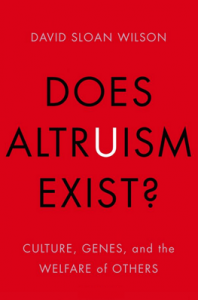Does Altruism Exist? Culture, Genes, and the Welfare of Others

In nature, absent humans, you rarely find truly altruistic behavior, and when you do, there’s an explanation available that shows how that behavior arises through what you might call natural causes. So mama bear risks her life to save her cubs? It’s all genetics: the cubs carry her genes, which may live on even if she perishes. “Eusocial” insects like ants and termites are apparent exceptions to the general rule that evolved along a special track.
The main problem is that humans persist in behaving altruistically in all sorts of other ways. The rules of natural selection mostly don’t seem to apply, and much confusion follows efforts to make them apply. However, if we think in terms of cultural selection as something particular to our species, and that follows rules which differ from natural selection, the fog is easier to penetrate. In fact, some serious scientists are talking about altruism as a foundational element for the cultural evolution of our species.
David Sloan Wilson is a pioneer in this effort, with his development of the principle of multi-level group selection. The essential idea is this: culturally organized groups tend to act as organisms in their own right. Within such a group, the selfish individuals tend to come out ahead (per Richard Dawkins’ selfish gene theory), but between groups, those composed of individuals who behave altruistically win.
What makes individuals behave altruistically against their selfish interests? The answer is that cultural evolution operates in favor of cultural traits that encourage internal cohesion. And within the group, this favors the evolution of features that cause individuals to act in ways that benefit the collectivity, even though such acts may come at a cost to the individual. In the long run, when groups compete, altruism wins out over selfishness.
This principle is the central theme of Wilson’s life work and particularly of his latest book, Does Altruism Exist? Culture, Genes, and the Welfare of Others (Yale University Press, 2015). The author is a brilliant theorist who not only knows his subject but understands why his many critics oppose him. In this book he spells out his counterarguments while recapitulating his own central theses. It’s a dense piece of work, and it takes time and patience to unpack it. For many readers, getting to the essence of his arguments will be heavy going.
Nevertheless, this is an important book with important ideas. Some of these ideas are central to the evolving humanist worldview, or ought to be. So, in the interest of all concerned, I have ventured to reduce some of Wilson’s arguments to their bare essentials. I know I’ll be guilty of oversimplification, and for certain I’ll be leaving important ideas out, but perhaps this modest attempt at “multi-level selection lite” will encourage you to go read the book yourself.
1) Proximate vs. ultimate causation: From the evolutionist’s perspective, what happens is more important than why it happens. Let the moralists and philosophers worry about the “why” issues, while the scientists focus on the results. It is important to keep in mind that the ostensible reasons for a behavior are usually quite different from the evolutionary purpose they serve.
2) Major evolutionary transitions: Sometimes, when group selection within an entity evolves to where internal dissension is minimal, it can join symbiotically with other groups to form a new entity that then competes at a higher level of organization. Wilson subscribes to the idea that all life results from this kind of symbiosis. Our own bodies are aggregates of systems that are composed of cells whose ancestors originally existed independently but united to form higher-level structures. Cultural evolution continues this pattern of biological evolution, with individuals forming natural “cells” of smallish groups that then aggregate into larger groups to mutual benefit. As this joining process continues, it eventually creates a system of levels of social organization that mimics the biological ascent from simpler species to more complex ones. Hence the “multi-level” part of the term “multi-level group selection.”
3) Homo economicus and the “invisible hand”: F.A. Hayek and Milton Friedman are godfathers of the currently popular image of the “invisible hand,” a theory which holds that the individual working inside that economy (Homo economicus) acts on selfish motives only, but the net result is benign in terms of the economy as a whole. Wilson dismisses Homo economicus as an impossible oversimplification of what actually motivates individuals operating inside the economy. But then he concludes that in fact there is such an invisible hand at work if you think of it not as the aggregate of a lot of purely selfish decisions, but as the more complex operation of multilevel group selection, whereby competition between economic units encourages the growth of altruistic behavior within them.
4) Equivalence: Wilson could have simplified this part of his discussion if he had started with the parable of the blind men and the elephant. He discusses how sometimes theories evolve that are quite different and evoke strong disagreement, but eventually we learn enough to realize we are all talking about the same thing, just described differently. He doesn’t insist that we always end up this way; many theories are just plain wrong and end up on the scrap pile. But he does hold out the hope that when we are talking about human cultural evolution, some of us at least can end up on the same page.
Humanists should welcome this olive branch, if that’s what it’s intended to be. Bridging the gap between the selfish gene theory and group selection theories would be a great development for the humanist cause. And I hope that David Sloan Wilson’s critics, who still oppose group selection in theory, will keep this in mind as they take issue with parts of his argument—which they certainly will—and that they are able to recognize Wilson’s substantial efforts towards advancing our understanding of humanist ethics.
